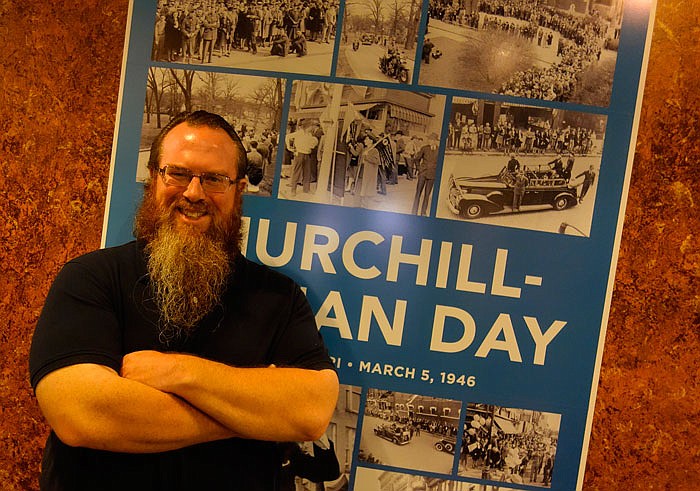Ronald Reagan was president during most of the 1980s, taking office Jan. 20, 1981, and leaving office exactly eight years later.
Sometime in between, Tobias Gibson found politics. Reagan was "his" president, he said.
"I came of age under Reagan," said Gibson, an associate professor of political science and security studies at Westminster College. "He is the president responsible for my interest in politics."
But another one comes close, he added.
"Woodrow Wilson is the only president to have a Ph.D in political science," he said.
Gibson grew up in Indiana.
"I was born in Ohio, but technically I only lived two days there," he said. Long before he went to college, he was that kid in the hallway who decorated his locker in a way all his own.
"In high school, a lot of the boys had Sports Illustrated swimsuit models," he said. "I had pictures of former presidents in my locker - no kidding, for real."
One of his first memories is of March 30, 1981. On that day - to impress an actress - Texan John Hinckley Jr. attempted to kill Reagan outside a Hilton Hotel in Washington, D.C. Press Secretary James Brady was critically wounded, and the last of the six bullets fired ricocheted off the president's limo and hit Reagan in the left underarm, lodging in his rib.
"I remember sitting up all night watching the footage," he said. "I was about 8 years old when he got elected and when he took office."
Gibson also remembers when Korean Air Lines Flight 007 was shot down on Sept. 1, 1983, while flying through Soviet prohibited airspace. The Soviet Union later admitted shooting the plane down, which killed 269 people including U.S. Rep. Larry McDonald, of Georgia.
"I remember asking my fifth-grade teacher if we were going to go to war," he said.
Gibson attended Northeast Missouri State University (now Truman State University), took a break, then attended the University of Indiana-Bloomington to complete his undergraduate work. He said only two professions interested him.
"For a long time, I thought I was going to be an attorney," he said. "The only two things I really ever thought of being were a lawyer or professor."
Both were captivating choices, but the professor gig won out. Gibson got his doctorate at Washington University in St. Louis and started teaching.
"The first class I ever taught on my own was at Wash U," Gibson said. "My first real teaching job was at Monmouth College in Monmouth, Illinois."
He taught there for three years, then came to Westminster College in 2009. Fulton is his wife's hometown, and he said he loves it.
"I am now the new, since July 1, Social Science Division chair," Gibson said.
He puts together educational programs such as the recent Westminster Institute for National Security, an intensive, residential academy for high school students. He keeps a sharp eye on current events and global trends and agrees the world has changed dramatically since the United States was attacked on Sept. 11, 2001.
"We're far more aware of terrorism, both internationally and domestically," Gibson said. "Growing up in the 1980s with the threat of Russia, it seemed like all the terrorist threats were always international."
He mentioned incidents such as airplane hijackings and even the murder of the wheelchair-bound American citizen Leon Klinghoffer when the ship Achille Lauro was hijacked off the coast of Egypt on Oct. 7, 1985.
"It seemed like (terrorist activities) were always somewhere else," Gibson said. "Even that - the Achille Lauro - didn't resonate as a threat here. Now, even a mall shooting in Africa seems much more connected."
People may connect in deeper ways because of the web, he added.
"Another thing since 911 is the rise of the internet," he said. "If you're prone to fear, if violence is what you seek, it's literally a fingertip away."
But even with a heightened awareness of terrorist threats, Gibson said he thinks Americans should be more alert to potential threats from aggressive governments and resist being swayed by politicians urging panic and fear.
"I would encourage people not to get too focused on ISIS or al Qaeda," he said. "I'm more concerned about nation states than terrorism. Quite frankly, we counter terrorism pretty well."
Gibson said he's looking forward to this year's Hancock Symposium, slated for Sept. 14-15 and focused on "pushing the boundaries of science." The college has invited Dr. Bennet Omalu, a Nigerian-American physician, forensic pathologist and neuropathologist. Omalu first identified and raised awareness of a debilitating form of brain damage in many former professional football players, and he will deliver the Green Foundation Lecture at 1 p.m. Sept. 15.
In 10 years, Gibson sees himself a little bit older but still doing his thing at Westminster College.
"It's wonderful here," he said. "Every year, I'm given new hope. I see all these bright, excited, determined students come in. I fear less and less for the future of this country. I send students to go work at Washington; I send them to law schools and Teach For America. These kids are bright, hard-working and dedicated."
While not every student will become president of the United States or head football coaches - Gibson is an assistant football coach at South Callaway schools - every person has an important role to play.
"The world needs informed followers, too," he said. "You have no idea the pride I feel."

